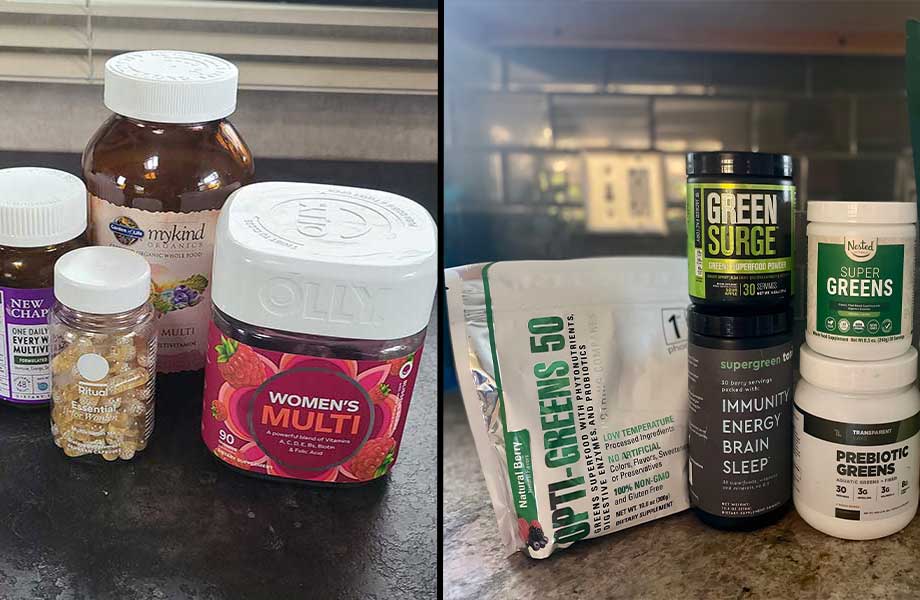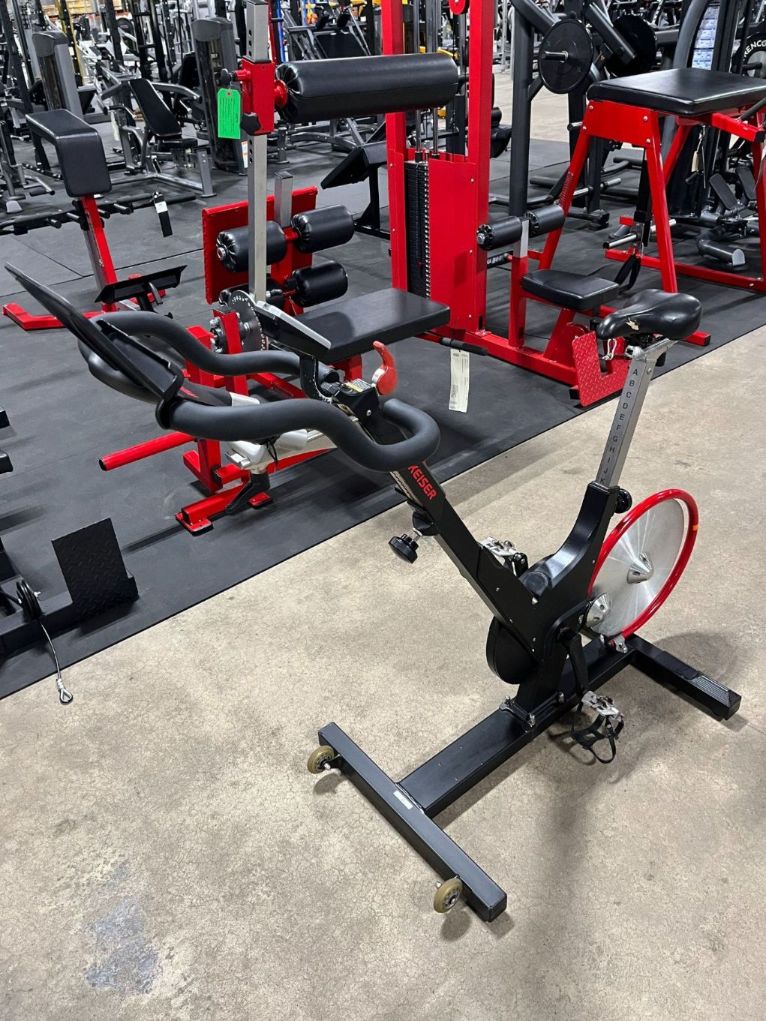Greens powders are taking the wellness scene by storm, but are they really all that different from tried and true multivitamins? These supplements are popular for their convenience and ability to supply essential vitamins and minerals that aren’t always abundant in Western diets. Since they both aim to amplify micronutrient intake, it’s no wonder you’re likely questioning their distinctions.
In this greens powder vs multivitamins article, we’ll break down their key similarities and differences. Leveraging my expertise as a registered dietitian nutritionist, I will delve into the purposes and nutritional benefits of both. Ultimately, I hope to guide you in determining which supplement best suits your lifestyle.
RELATED: Best Multivitamins for Men | Best Multivitamins for Women
Medical disclaimer: This article is intended for educational and informational purposes only. It is not intended as a substitute for medical advice. For health advice, contact a licensed healthcare provider.
What Is a Greens Powder?
Greens powders are nutritional supplements made from a blend of whole-food, plant-based superfoods in powdered form. These powders contain numerous health-boosting ingredients, including veggies, fruits, algae, herbs, probiotics, prebiotics, and digestive enzymes. Many ingredients are rich in vitamins, minerals, phytonutrients, and antioxidants, while others support gut health and digestion.
Most super greens powders are designed to be taken daily and can easily be mixed with water or other beverages or smoothies to offer a quick nutrient boost. The mixture is typically green (hence the name) and has a grassy, earthy taste.
RELATED: How to Make Greens Powder Taste Better
These supplements offer a high concentration of nutrients per serving and often appeal to those who lack the recommended five servings of fruits and vegetables daily. That said, greens powders should not be considered a substitute for a balanced diet, but rather used as a supplement to increase plant-based nutrients.

Benefits of Greens Powder
Greens powders (also known as super greens) present various potential benefits, but the limited studies available don’t provide enough conclusive evidence to solidify these claims, and further research is needed. Nonetheless, here are a few benefits you may experience from a greens powder.
RELATED: Super Greens Powder Benefits
Immune Support
Greens powders contain several vitamins and minerals associated with maintaining a healthy immune system. While they likely don’t offer any more immune support than a nutritious diet, they may ensure plenty of immune-boosting nutrients when fresh greens aren’t available. Zinc, vitamin C, vitamin D, and selenium are just a few nutrients provided by greens powders that are identified to support immune health.
Increased Energy
Taking a greens powder may help put a little extra pep in your step. Many of the best greens powders claim to improve energy levels due to their robust B vitamin content, including B12, thiamin, riboflavin, B6, pantothenic acid, biotin, folic acid, and niacin. These vitamins are essential for energy production. To be clear, they don’t provide energy, but they help your body convert food into ATP, the cellular energy needed for daily tasks and exercise.
Reduced Inflammation
Greens powders contain a variety of antioxidant-packed ingredients, including berries, spinach, kale, and spirulina. Antioxidants (think vitamin E, vitamin A, beta-carotene, and vitamin C) found in these foods help reduce inflammation and mitigate cell damage caused by free radicals. As inflammation and cell damage are associated with chronic diseases such as heart disease and diabetes, the intake of antioxidants becomes vital in diminishing inflammation.
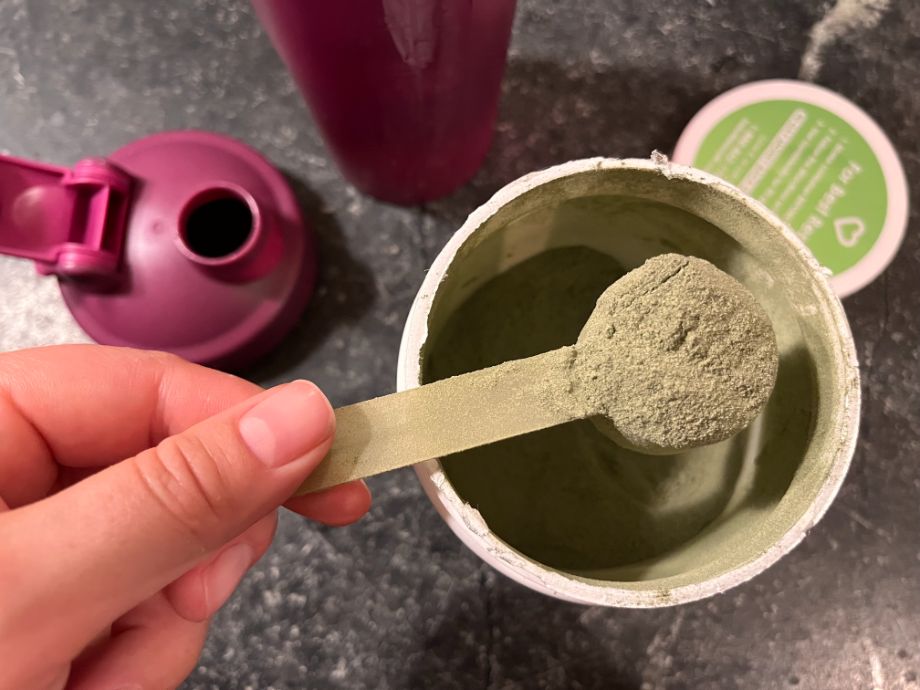
A small 2021 study1 including 18 individuals found that taking six fruit and vegetable capsules daily for eight weeks led to elevated blood levels of various antioxidants. These included vitamin C, carotenoids, all-trans-retinol (vitamin A), lycopene, and alpha-tocopherol. This demonstrates that when greens powders are taken consistently, they may boost antioxidant levels in the blood, potentially aiding in reduced inflammation over time.
Healthy Blood Pressure
High blood pressure, also known as hypertension, is linked to several heart complications, including heart failure, heart attack, and stroke. Supplementing your daily eating habits with a greens powder may support a healthy blood pressure. The ingredients in these supplements serve as a source of calcium and potassium, minerals known to help regulate blood pressure.
In a study2 involving 40 participants with elevated blood pressure, the impact of fruit and vegetable powder on cardiovascular health and blood pressure was examined over 90 days. Following consistent supplementation, both systolic and diastolic blood pressure levels notably decreased. The average systolic blood pressure decreased from 140.4 to 128 mm Hg, and the average diastolic blood pressure decreased from 90.2 to 83.1 mm Hg.
What Is a Multivitamin?
A multivitamin is a supplement containing a combination of essential vitamins and minerals, typically in synthetic or extracted forms. Multivitamins usually come in tablet, capsule, or gummy form. Some who have trouble swallowing a pill, often prefer the gummy multivitamins. Like greens powders, they provide a convenient way to consume micronutrients that may be lacking in your diet, reduce your risk of nutrient deficiencies, and support overall health.
Depending on the brand and product, the micronutrients in multivitamins vary. However, they typically contain a range of vitamins, such as A, C, D, E, and K, along with various B vitamins. Additionally, minerals like magnesium, calcium, selenium, and zinc are commonly included.
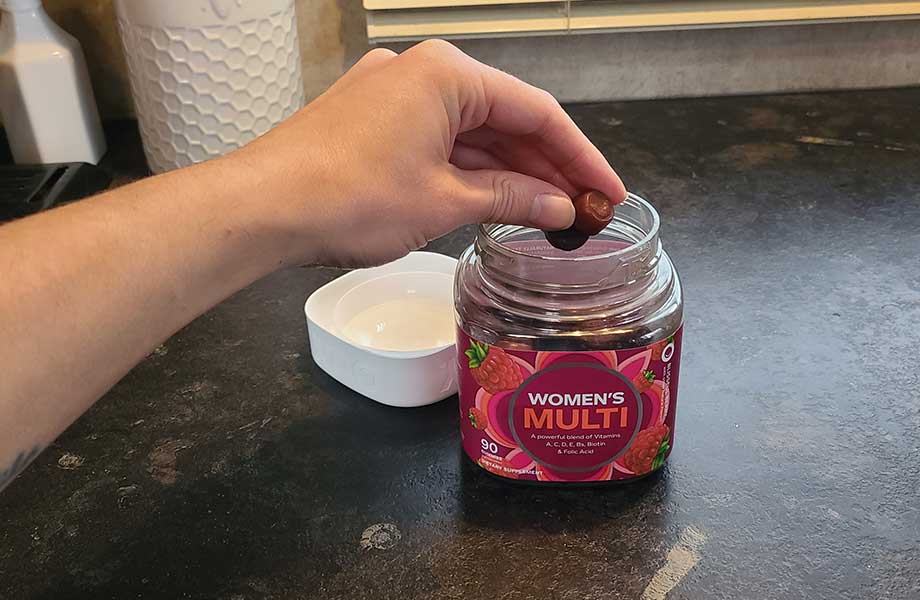
Multivitamins are often formulated to meet the needs of different life stages. It’s common to find prenatal vitamins, teen vitamins, and vitamins for adults over 50 because these groups have differing micronutrient needs.
Benefits of Multivitamins
If you’re already eating a well-rounded, colorful diet you may be getting plenty of vitamins and minerals through food. In this case, you likely wouldn’t benefit much from adding a multivitamin.
Some individuals benefit more from multivitamins than others. For instance, if you’re pregnant, menopausal, or over the age of 50, a multivitamin may help you reach additional nutrient intake needs.
Furthermore, some potential benefits of multivitamins overlap with those of greens powders. For instance, both may improve energy levels and protect your immune system, since they offer many of the same nutrients. Here are a few more benefits one may experience from taking a multivitamin.
Supports a Healthy Pregnancy
During pregnancy, there is an increased need for micronutrients to promote a healthy pregnancy and baby. Folic acid and iron are two common nutrients needed at an increased demand during this time and are typically included in prenatal multivitamins.
Women have an increased need for folic acid to help prevent birth defects, called neural tube defects, which happen during the early weeks of pregnancy. Additionally, the need for iron increases during pregnancy3 due to increased blood volume to support the growing baby. This can reduce iron levels in the blood, making it important for pregnant women to meet their increased iron requirements to prevent iron deficiency anemia. As nutrient needs vary, consult with your healthcare professional to discuss dietary supplements.
Strengthens Bone Density
Elderly individuals, especially postmenopausal women, face an elevated risk of osteoporosis, a condition marked by brittle and fragile bones. Hormonal changes and a sedentary lifestyle can contribute to diminished bone strength in aging adults.
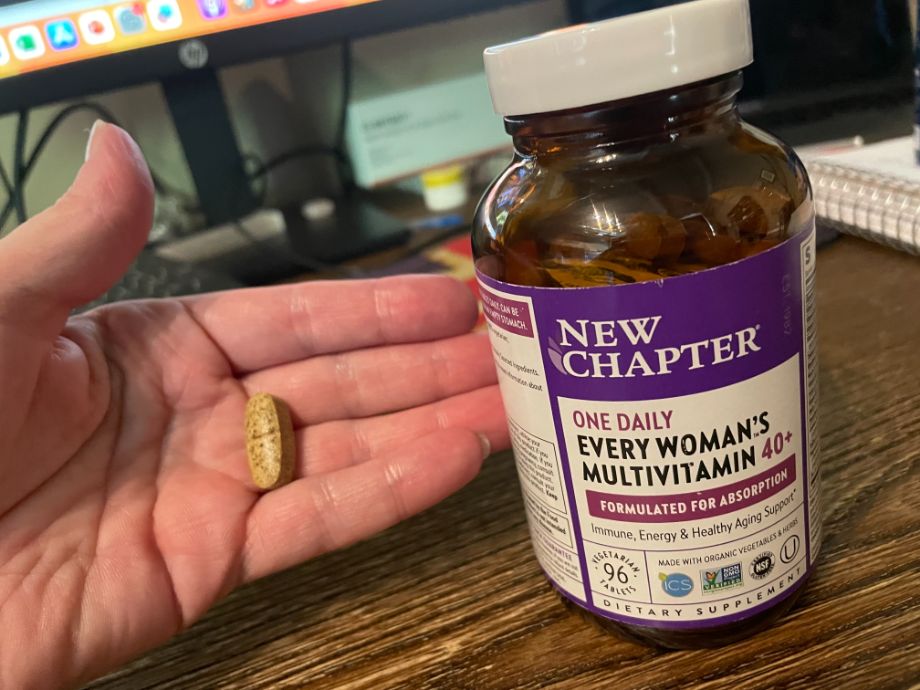
Multivitamins with vitamin D and calcium may help maintain bone density and reduce the risk of osteoporosis for these individuals. Vitamin D is needed for calcium absorption, and calcium is stored in the bones to enhance their strength.
Supports Brain Function
As people grow older, they may start to notice a decline in memory, focus, and cognitive function. Multivitamins contain B vitamins and minerals that support normal brain function.
A recently published study4 explored the effects of cocoa extract and multivitamin supplements on cognition in individuals aged 65 and older. The 2,200 participants were given either a daily cocoa extract supplement, a multivitamin-mineral supplement, or an inactive placebo for three years. Annual cognition tests revealed that those taking the multivitamin exhibited higher cognition scores related to memory, attention, planning, and organization.
Greens Powder vs Multivitamins: Which One Is Better?
Ultimately, the choice between greens powder or multivitamin depends on your dietary preferences and nutritional needs. Greens powders stand out for those who prefer whole-food nutrients, antioxidant-rich ingredients, and added digestive enzymes. On the other hand, multivitamins could be the best choice for anyone who doesn’t want to mess with mixing a drink, has specific nutrient needs, or needs a targeted formulation for a specific life stage.
Can You Take Both?
Steer clear of using both a greens powder and a multivitamin. Keep in mind that the majority of your nutrients should come directly from the foods you eat, not supplements. Taking two supplements designed to address potential nutritional gaps is unnecessary and could be dangerous. Overloading the body with nutrients beyond the upper intake levels5 can potentially result in adverse side effects or toxicity.
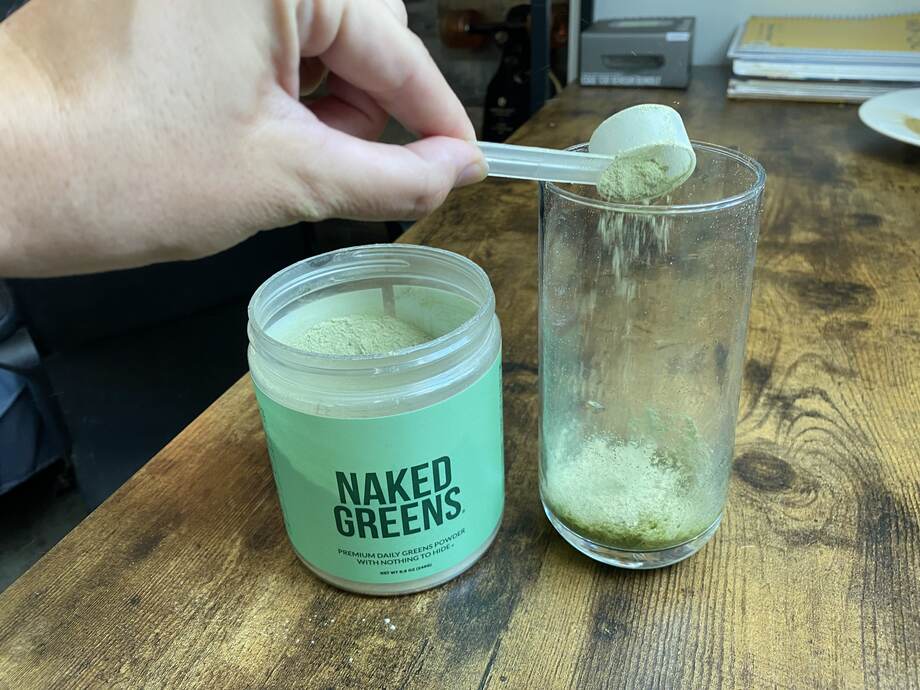
Unfortunately, many greens powders don’t list their specific vitamins and minerals content on the label. So, while you may be able to determine that you’re getting plenty of micronutrients from their superfood ingredients, it’s impossible to know exactly how much of each is provided.
Greens Powder vs Multivitamins: Final Thoughts
Greens powders and multivitamins are intended to provide vitamins and minerals that you may not be consuming enough of through diet alone. They’re not intended to replace a whole-foods, varied diet, but rather supplement your intake to ensure you’re consuming adequate amounts of essential nutrients. Both offer several potential health benefits, especially if you aren’t consuming adequate amounts of nutrients through food, including supporting a resilient immune system, strengthening bones, and reducing inflammation. Determining which is the best fit for you comes down to dietary preferences and nutrient needs.
- Some prefer the convenience of multivitamins over mixing a greens powder drink
- Individuals who prefer whole-food nutrients may opt for greens powders filled with green superfood ingredients
- Those with specific nutrient needs would likely prefer a multivitamin with clearly listed micronutrients and doses on the nutrition label
- Nutrients from greens powders made from whole foods may be more bioavailable than multivitamins that use synthetic forms of vitamins and minerals
Greens Powder vs Multivitamins: FAQs
Is greens powder or a multivitamin better?
Determining whether a greens powder or multivitamin is better comes down to personal dietary preference and nutrient needs. Both offer vitamins and minerals to help fill potential dietary gaps. Greens powders appeal to those who prefer to consume whole-food sources, while multivitamins tend to be more convenient and come in targeted formulations to meet the needs of different life stages.
Does Athletic Greens replace my multivitamin?
It’s not advised to take a greens powder supplement and multivitamin at the same time, so check the Athletics Greens label to ensure it offers the vital nutrients you need for optimal well-being depending on factors like age, gender, and health conditions. If it includes the nutrients you need in the proper doses, then it could replace a multivitamin.
Are green powders actually effective?
Powdered greens offer several potential benefits, but limited research is available to substantiate these claims. Powdered greens may reduce inflammation, improve blood pressure, and support a healthy immune system.
Can super greens replace multivitamins?
Greens powders may not contain all of the vitamins and minerals that you get from a comprehensive multivitamin. Also, neither option can replace the nutritional benefits of eating a healthy diet.
These statements have not been evaluated by the Food and Drug Administration. This product is not intended to diagnose, treat, cure, or prevent any diseases.
References
- Dams S, Holasek S, Tsiountsioura M, et al. An encapsulated fruit, vegetable and berry juice powder concentrate increases plasma values of specific carotenoids and vitamins. Int J Vitam Nutr Res. 2021;91(1-2):77-86. doi:10.1024/0300-9831/a000609
- Zhang J, Oxinos G, Maher JH. The effect of fruit and vegetable powder mix on hypertensive subjects: a pilot study. J Chiropr Med. 2009;8(3):101-106. doi:10.1016/j.jcm.2008.09.004
- Institute of Medicine (US) Committee on Nutritional Status During Pregnancy and Lactation. Nutrition During Pregnancy: Part I Weight Gain: Part II Nutrient Supplements. Washington (DC): National Academies Press (US); 1990. 14, Iron Nutrition During Pregnancy. Available from: https://www.ncbi.nlm.nih.gov/books/NBK235217/
- Baker LD, et al. Effects of cocoa extract and a multivitamin on cognitive function: A randomized clinical trial. Alzheimers & Dementia. 2022. Epub Sept. 14. doi: 10.1002/alz.12767.
- U.S. Department of Health and Human Services. (n.d.-a). Office of dietary supplements – nutrient recommendations and databases. NIH Office of Dietary Supplements.


